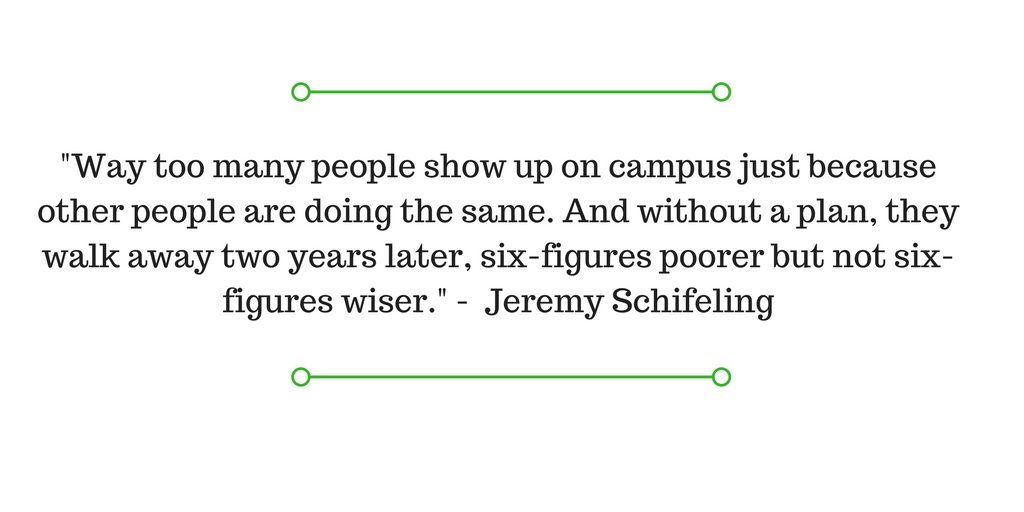76ers’ JJ Redick Had To Reschedule GMAT to Accommodate Playoff Schedule

When the Philadelphia 76ers season hit its lowest point, guard JJ Redick, a Duke University alum, was apparently planning on earning his MBA.
How To Begin Your MBA Search, Pt. 3: Recognizing the Best Resources

You can find the first and second installments of our ongoing “How To Begin Your MBA Search” here.
So, you’ve narrowed down the list of business schools to which you’re applying, keeping in mind location, student body make-up, potential networking opportunities, the return on investment, and your professional goals. But while there are an additional host of ineffable qualities that guide a prospective MBA to one program or another, you must also keep in mind the resources of the programs that make up your short list. The importance of these resources will certainly depend upon your own subjective needs, but most potential MBAs will find it necessary to consider the following factors before making decisions on program choices.
Money, Money, Money
Suffice to say, business school is not cheap. Tuition at some programs can soar north of $60,000 USD per year, and unless you are currently working and your employer is chipping in, you will probably worry about how you will pay for school (particularly if you’re out of the workforce). Thus, sussing out which schools provide merit, and finding need-based scholarships is a good method of finding which schools might make the top of your list. And while a significant return on investment is almost guaranteed with an MBA, it goes without saying that graduating with less debt is preferable to graduating saddled with loads of it. Luckily, according to U.S. News & World Report, many more schools are offering such financial assistance, so if you do your research and get busy applying for fellowships and awards, you might be able to lighten the dreaded b-school burden!
I Went Looking for a Job and Then I Found a Job
Hillary Schubach of Shine MBA Admissions Consulting says that potential b-school applicants should ask, “Are there campus resources, student organizations, and activities that align with your interests?” As discussed in the second part of our series on starting the MBA search, while building a network is important, a b-school’s career services resources are also well worth researching. Where are alumni placed? Does the career services office seem robust and well-staffed, and are the advisors in-house or outsourced? These should be pertinent questions to you and any future MBA.
Know Who You’ll Be Learning From
Finally, before settling on any program, identify the professors whom you’ll most likely be learning from, and maybe try to find out more about their teaching style. Stacy Blackman of Stacy Blackman Consulting suggests asking, “what teaching methods appeal to you? Are there particular teachers, courses, fields of study or extracurriculars that appeal to you at certain schools?”
While some of these questions might have been answered when you asked yourself questions regarding where you want to end up after graduation, it is worth reiterating that if you’re unable to learn in certain environments or within certain teaching styles, you won’t be able to achieve your goals as smoothly.
Schubach gives the following advice :
“Core classes and electives that fit your career goals are extremely important. Do your needs align with the academic strengths of the school? Are you looking for a general management program, or one where you can select a concentration in your target field?”
In other words, it isn’t just the professors, but the structure of the program itself that is worth looking at closely— are the core classes suitable to your end goals? Do you need more or less structure in an academic setting?
While it seems like there are an infinite number of factors to weigh when finding the right MBA program, remember that on graduation day, you will want to look back on your b-school experience as one that was well worth it, which makes the questions all the more necessary.
These LA Business Schools Are Helping Low Income Students Pursue Their Dreams

For many low-income applicants, unfortunately, the cost of an MBA program is just out of reach. That’s because, by the time you count tuition (often upwards of $80,000), boarding and books ($40,000), and other expenditures, the average cost of an MBA is around $140,000 according to Investopedia. And that’s all before you count lost salary for two years for a full-time MBA program.
What can you do?
For low-income MBA applicants in Los Angeles, California you don’t have to give up on your dreams due to money. Instead, business schools offer many options to help pay for your MBA program.
California DREAM Act
The California DREAM Act of 2011 is currently available to California residents who attended and graduated from high school in the state and are enrolled in an accredited California Institution of Higher Education. If you meet these eligibility requirements, you’ll be given access to California State financial aid and scholarships as well as specific university financial aid programs. In addition, need-based graduate applicants are eligible for the State University Grant (SUG) program, which awards up to $7,176 to help cover tuition.
California State University’s Long Beach College of Business Administration is just one of the MBA programs that provides this type of financial aid to low-income MBA applicants. The College of Business Economics at Cal State L.A. also accepts DREAM Act Applications for student financial aid.
Scholarships
MBA scholarships for low-income applicants are one of the best ways to help pay for your degree program. Scholarships vary by school and can range from a few thousand dollars per year to full-tuition coverage plus a stipend.
At the UCLA Anderson School, there are six unique fellowships available to MBA applicants.
- Donor Fellowships are awarded to MBA applicants based on professional development, intended career, community involvement, and/or financial need.
- Merit Fellowships are awarded based on the strength of a student’s application.
- External Fellowships are available for a variety of different situations and students. One example is the Girard Miller Foundation scholarship, which is awarded to a graduate student preparing for a career in state or local government finance.
Teaching Assistantships
For California MBA students, financial aid doesn’t stop in the first year. For second-year full-time MBA students, many Los Angeles business schools offer Teaching Assistantship (TA) positions. These positions are usually awarded to students who keep their grade point averages above a certain level and who apply and receive an appointment. The award amount varies by business school but, in some cases, covers 100 percent of a student’s services fee and tuition.
At UC Irvine’s Paul Merage School of Business, full-time MBA students who gain a TA appointment receive payment for 100 percent of their Graduate Student Health Insurance Program (GSHIP) premium. They also receive 100 percent of the Student Services Fee and Tuition components per quarter.
Military Veteran Aid
For low-income MBA applicants who also have a history of military service, there are many unique financial aid opportunities. The exact services available will depend on the school, but some of these programs are available at schools across California and the U.S.
First, there’s the Yellow Ribbon Program, which many Los Angeles business schools take part in, including Chapman University Argyros School of Business. This program awards MBA students up to $6,000 for tuition and fees. Another program open to military veterans is the Post-9/11 GI Bill, which includes payments directly to the university for tuition and fees, a monthly housing allowance, and an annual books and supplies stipend up to $1,000 per year.
Individual schools like the USC Marshall School of Business also offer their own specific scholarships for military veterans. The Schoen Family Scholarship Program for Veterans is available to full-time MBA students at Marshall and has, to date, provided a staggering $1.2 million in financial support to 173 students at the university.
Loans
Finally, most low-income MBA applicants in Los Angeles are eligible for federal student loans. Direct PLUS Loans are available to graduate students to help pay for educational expenses up to the cost of attendance. MBA students can request unsubsidized loans up to their full eligibility with an Income-Driven Repayment Plan that allows you to make payments based on your adjusted gross income. In most cases, payment will begin until after graduation.
For MBA applicants at Pepperdine University’s Graziadio School of Business and Management, financial aid loan application for Federal Graduate PLUS student aid and Federal Direct Stafford Loans is easy. The school provides loan counseling for graduate student borrowers, loan calculators, and more.
For more information about how your business school could help cover the cost of your MBA program, visit your school website and contact their financial aid office. Scholarships, loans, and aid opportunities vary per school. The Simple Dollar also has a handy guide on how DACA recipients may be able to handle financial expectations for students around the U.S.
Harvard Helps Business Students Take Startups to NYC

Launching a startup isn’t easy, but Harvard Business School is working to change that for its alumni with the start of its new RISE program. Put together by Harvard’s Rock Center for Entrepreneurship, the RISE program will help HBS graduates accelerate the growth of their NYC startups.
With the goal of seeing more of its alumni entrepreneurs make it big, the new HBS RISE program will offer a range of benefits and support. Planned programming will help new enterprises with the many challenges that accompany startup life—from developing culture to hiring employees, building leadership skills, managing boards, raising funds, optimizing sales, and more. The eventual goal is to help small ventures successful scale from just a handful of employees to hundreds.
In order to participate in the program, HBS alumni have to own a company that is revenue generating and has already raised $1 million in capital. These qualifications were set to help ensure that participating companies have the best chance for successful scaling.
YOU MAY ALSO LIKE: More Harvard MBAs Are Turning to Politics
According to Professor Thomas Eisenmann, faculty chair of the Rock Center, the RISE program is all about helping enterprises scale individually. “In the RISE program, HBS faculty members, alongside seasoned entrepreneurs, will convey best practices and frameworks to help entrepreneurs address startup challenges that can make or break a company,” he explained in a news release. “The program has been developed to leverage extensive faculty research on what it takes to successfully scale an enterprise.”
HBS alumni chosen for the program can expect to learn about scaling their businesses from both faculty and peers. RISE will be broken down into sessions, each of which will have curated content developed by other successful alumni entrepreneurs and investors. At the end of each session, a roundtable discussion will allow for candid conversation between peers where founders can discuss challenges and offer advice.
Nine HBS alumni founders have already been accepted into the first RISE cohort, including:
This article has been edited and republished with permissions from our sister site, Clear Admit.
How to Begin Your MBA Search, Part I

You’ve weighed your options, and it seems like getting an MBA might be the best route to attaining your professional and personal goals. You’ve considered the expense and the time spent away from the workforce that an MBA requires, and you’re finally ready to begin your MBA search.
You’ve even read Philip Delves Broughton’s advice against attending business school in The Economist, and still find yourself cracking GMAT Study Guides and searching ROI figures in U.S. News & World Report. But even if you’re the most motivated future MBA, it is of utmost importance to ask yourself a number of questions as you embark on the process of applying and gaining admission to business school.
“Understand Where You Want to End Up Before You Even Begin”
Those are the wise words of Jeremy Schifeling, the founder of Break Into Tech and a veritable guru on the subject of how to find meaningful work in the tech world without engineering experience. A graduate of the University of Michigan’s Ross School of Business, Schifeling also speaks to his experiences there, adding that “way too many people show up on campus just because other people are doing the same. And without a plan, they walk away two years later, six-figures poorer but not six-figures wiser.”
The end lesson from Jeremy’s advice? Suss out what you want to do with an MBA, and don’t just go into a b-school program to make a lot money, or because everyone else seems to be doing so. Make a plan, and even if that plan changes, you’ll still have a leg up on many of your classmates.

Figure Out What Programs Best Fit Your Plan
Let’s imagine that you know that you are interested in supply chain management. You could search around the web for schools that have special programs in logistics and supply chains, but that will only take you so far. Consultant Stacy Blackman notes, “some of our clients call up companies they are interested in working with to learn their opinions of target schools and where they recruit. If you are very specific about where you want to end up, this is a great idea.” Thus, if you’re certain about a career in operations and logistics, it might behoove you to contact companies like XPO Logistics or Werner Enterprises to see what b-school programs their management team recruits from.
If you’re not certain of exactly what career you want an MBA to lead to, but you have a general idea of the business field that you’d like to pursue, then it might be more reasonable to think about where you want to end up.
Location, Location, Location
Paul Bodine of Paul Bodine Consulting/Admitify says that it is absolutely necessary to ask yourself, “what geographies are essential to your post-MBA career and/or life goals?” The question can make all the difference in what schools you consider applying to—Bodine notes that “you can spare yourself the challenge of seeking admission to the top 10 schools if you have a defined region where you want to make your stand professionally and personally.” If you are wedded to working in traditional commodities markets (and bitcoin, surprisingly), then it wouldn’t make sense to stray far from the Chicago Mercantile Exchange, for example. If your search is geographically limited for reasons beyond your control, then find out which programs suit your needs best within that area. A tech business mind in the South might ponder schools in Knoxville or Atlanta, whereas a future lumber baron in the Pacific Northwest need look no further than Oregon State in Corvallis. There are opportunities everywhere, but it is up to you to find those that are most in line with your goals!
Stay tuned for part two of our series, coming soon!
How To Save Valuable GMAT Time

MetroMBA’s sister site Clear Admit recently offered up some essential tips about how to get an MBA, specifically when it comes to saving valuable GMAT time, which you can read below.
When working through GMAT Quantitative problems, at times some students will comment, “well, I solved this problem this way, so that’s fine right???”
Totally. As we’ve covered in quite a few posts, there are always several different ways to get to the correct answer for a problem solving or data sufficiency question. However, there are ways that are more efficient than others, and it’s all about what you do “inside” your work on the problem that makes a difference.
Reality: the GMAT is a timed test. With oodles of time, it’s likely that a lot of us could get to the right answer. But the GMAT expects that you complete quantitative questions without a couple minutes, on average. This means that each question CAN be done within that time frame, but it’s more likely that a savvy, high-scoring test taker will average out to two minutes a problem.
There are quite a few problems, particularly in the 500 range, that can be completed in just a spare few seconds if you understand the core concept being tested. There are others that require a few calculations, but once you see the pattern or where a problem is moving, the right answer becomes apparent. And, lastly, there are questions in this space that are best accomplished working backwards from the answer choices, because those answers choices show us where to get started.
Completing these questions as quickly as possible is essential to “saving up seconds” for higher order thinking questions.
But, once we get to the more complex questions, where we save time is all on a) recognizing when we’ve taken the wrong path and need to circle back and/or b) having efficient scratch work.
Many students are so used to “showing the work” that they waste time in scratch work writing out steps they already understand or manually doing calculations in their heads, on their fingers, or simply, more efficiently. Saving seconds allows us to apply time where it is needed (setting up the problem, double-checking the right answer) supporting a high score.
Over the next few posts we’ll highlight questions that fall into this category. In the meantime, as you approach your quantitative practice, think – where can I shave seconds?
Stay tuned to MetroMBA and Clear Admit for more valuable advice about admissions, GMAT tips, and more.
